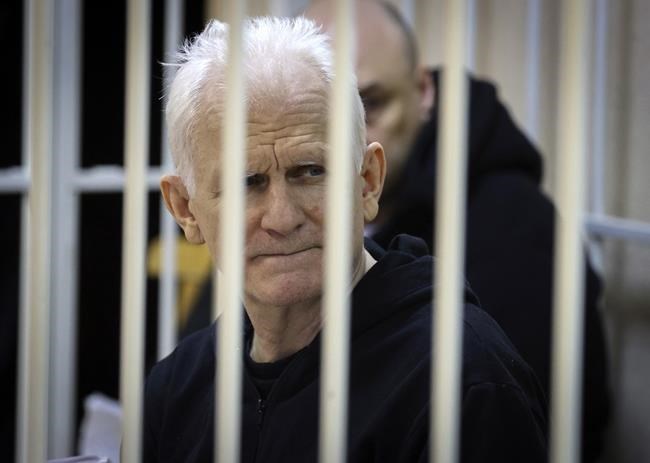TALLINN, Estonia (AP) — A court on Friday sentenced Belarus’ top human rights advocate and one of the winners of the 2022 Nobel Peace Prize, to 10 years in prison.
The harsh punishment of Ales Bialiatski and three of his colleagues came in response to massive protests over a 2020 election that gave authoritarian President Alexander Lukashenko a new term in office.
Lukashenko, a longtime ally of Russian President Vladimir Putin who backed Putin’s invasion of Ukraine, has ruled the ex-Soviet country with an iron fist since 1994. More than 35,000 people were arrested, and thousands were beaten by police, in a brutal crackdown he unleashed on the protesters, the largest in the country’s history.
Belarus stands as an outlier in its support of the year-old Russian invasion, with other countries in the region not backing Moscow publicly.
Bialiatski and his cohorts at the Viasna human rights center he founded were convicted of financing actions violating public order and smuggling, Viasna reported Friday.
Valiantsin Stefanovich was given a nine-year sentence; Uladzimir Labkovicz seven years; and Dzmitry Salauyou was sentenced to eight years in prison in absentia.
During the trial, which took place behind closed doors, the 60-year-old Bialiatski and his colleagues were held in a caged enclosure in the courtroom. They have spent 21 months behind bars since the arrest.
In the photos from the courtroom released Friday by Belarus' state news agency Belta, Bialiatksi, clad in black clothes, looked wan, but calm.
Viasna said after the verdict that all four activists have maintained their innocence.
In his final address to the court, he urged the authorities to “stop the civil war in Belarus.” Bialiatski said it became obvious to him from the case files that “the investigators were fulfilling the task they were given: to deprive Viasna human rights advocates of freedom at any cost, destroy Viasna and stop our work."
Exiled Belarusian opposition leader Sviatlana Tsikhanouskaya denounced the court verdict on Friday as “appalling.” “We must do everything to fight against this shameful injustice (and) free them,” Tsikhaouskaya wrote in a tweet.
The sentence handed to Bialiatski and his colleagues elicited outrage in the West.
The Norwegian Helsinki Committee, a nongovernmental organization working to ensure that human rights are respected in practice, said that it was “shocked by the cynicism behind the sentences that were just issued to our Belarusian friends in Minsk.”
”The trial shows how Lukashenka’s regime punishes our colleagues, human rights defenders, for standing up against the oppression and injustice," Secretary General Berit Lindeman said in a statement.
German Foreign Minister Annalena Baerbock said in a tweet that the proceedings against the activists "were a farce.”
“The Minsk regime is fighting civil society with force and prison,” she added. “This is just as much a daily disgrace as Lukashenko’s support for Putin’s war. We call for the end of political persecution and freedom for the more than 1,400 political prisoners.”
Bialiatski is the fourth person in the 121-year history of the Nobel Prizes to receive the award while in prison or detention.
_______
Associated Press writers Jan M. Olsen in Copenhagen, Denmark, and Geir Moulson in Berlin contributed to this story.
Yuras Karmanau, The Associated Press


